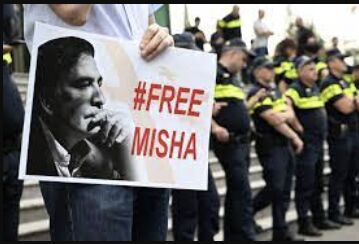Senior Ukrainian Official Accused of Plotting to Overthrow Georgian Government in Troubling Twist of Events
In a troubling development, Georgia's State Security Service accuses a senior Ukrainian official of plotting to overthrow the government through mass unrest, further straining relations between the two ex-Soviet countries. Escalating tensions and allegations put Georgia's EU membership aspirations, its relations with Ukraine, and its dynamics with Russia at stake.
In a troubling development, the State Security Service of Georgia (SSG) has accused a senior Ukrainian official of plotting to overthrow the Georgian government through mass unrest. The tensions between these two ex-Soviet countries have been escalating, with Georgia's ruling Georgian Dream party being accused of cooperating with the Kremlin despite Russian forces being deployed in separatist regions of Abkhazia and South Ossetia since 2008. According to the SSG, Giorgi Lortkipanidze, the deputy chief of Ukraine's military counterintelligence and former deputy interior minister of Georgia, is allegedly behind the plot to destabilize the government through violent means.
The security service claims that Georgians fighting against Russian forces in Ukraine, including a bodyguard of ex-President Mikhail Saakashvili, are among the conspirators being trained near Ukraine's border with Poland. Ukraine has been urging Georgia to release Saakashvili, who has been a Ukrainian national since 2015 and serves as a top advisor to Ukrainian President Volodymyr Zelenskyy. Kyiv has accused the Georgian authorities of carrying out Kremlin-backed orders to harm Saakashvili and has demanded his transfer to a foreign clinic.
The plot, according to the SSG, involves planning anti-government protests for October and December, coinciding with the European Commission's decision on Georgia's EU membership application. The SSG claims that the plot is being coordinated and funded by a foreign country. The European Union recognized Georgia's "European perspective" last year but deferred its membership application while granting candidacy to Ukraine and Moldova. This decision has sparked mass antigovernment protests in Tbilisi, as the Georgian government faces accusations of undermining its commitment to democracy and its EU membership bid.
Georgian Legion armed group commander Mamuka Mamulashvili, who is fighting in Ukraine, denies the SSG accusations and suggests that they are orchestrated by the Kremlin. He also challenges the lack of evidence provided by the Georgian security service. These recent allegations further strain the already complicated relationship between Georgia, Ukraine, and Russia. As Georgia deepens its relations with Russia, ties with Ukraine may be tested. The Georgian government has refrained from blaming Moscow for its support of the breakaway regions of Abkhazia and South Ossetia, despite resentment among many Georgians.
Moreover, Georgia has refrained from imposing sanctions on Russia and allowed direct flights between the two countries. As the situation unfolds, it remains to be seen how Georgia's EU membership aspirations, its relations with Ukraine, and its complicated dynamics with Russia will be affected by these escalating tensions and allegations.




